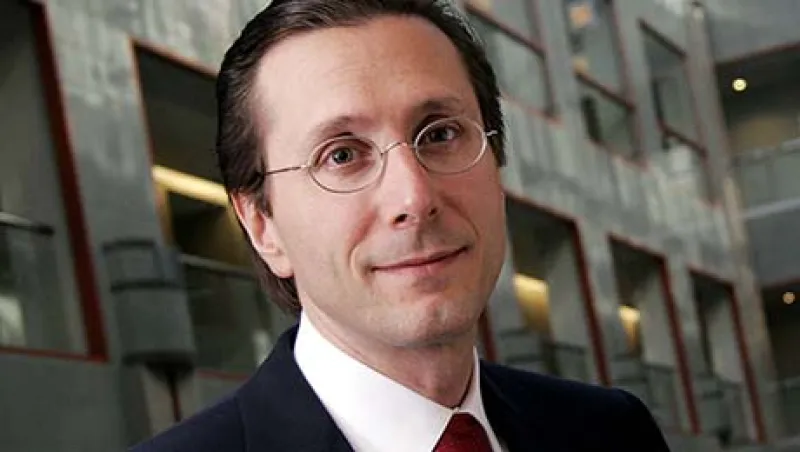Bruce Berkowitz doesn’t worry about going against the flow — at least not in the short term. He is a concentrated value investor who bets on only a handful of stocks, so it comes with the territory.
“With the type of value investing I do, you look very wrong until you’re right,” asserts Berkowitz, founder and chief investment officer of Fairholme Capital Management in Miami. He emphasizes that his investing success stems from the very low price he is willing to pay for a given security. That gives him the greatest chance of making money in the long run, but it also means he’s often buying in the middle of a financial maelstrom (get more on Berkowitz’s value approach in “3 Steps to Successful Investing”).
In 2013 the $8.8 billion Fairholme Fund benefited from investments Berkowitz made back in 2011, including in Bank of America Corp. and American International Group. At the time, many investors had been badly burned by those stocks in the financial crisis — “These companies were almost destroyed,” he says — and worries about a double-dip recession were still keeping most potential buyers at bay.
Berkowitz’s willingness to go against the herd paid off handsomely last year as financial stocks rallied strongly. Shareholders in the Fairholme Fund enjoyed a return of 35.54 percent in 2013, exceeding the 32.39 percent return of the Standard & Poor’s 500 stock index. That performance helped Berkowitz win the top honor last month as Institutional Investor’s 2014 Money Manager of the Year. Since the fund’s inception in 1999 to year-end 2013, the fund has returned a cumulative 450.94 percent, versus 64.68 percent for the S&P 500.
“In 2013 our success was all about residential real estate,” says Berkowitz, 55. “But it’s exactly why we did well in 2012 and why we did horribly in 2011.”
Berkowitz, who moved to Miami from New Jersey in 2006 to get away from the constant and distracting market talk of the New York financial world, is a big believer that investing goes far beyond a good instinct for numbers. “You have to have a liberal arts education and a sense of history and biology,” he says.
Behavioral finance is very much in vogue, but it has always been part of Berkowitz’s DNA. Human beings are wired for movement and momentum, he contends. In prehistoric times, if thousands of people were running in one direction, it made sense to run with them rather than risk being a predator’s lunch, he says. Today, however, investors need to recognize that these natural tendencies work against long-term success in the markets. Herding and running with the crowd almost guarantee failure, he says. “Bruce is very bright, very hardworking, and he marches to his own drummer,” hedge fund billionaire Leon Cooperman, who has known Berkowitz for more than a decade, told II in 2011. “He’s a guy whose investing views I respect.”
Berkowitz, who loves complex financial stocks that value investors often avoid, aims to buy stocks at cheap price to obtain a margin of safety and to buy time for the market’s perceptions of a beaten-down stock to change. He then determines whether a company is essential to an economy. But because Fairholme is buying cheap, the companies in its portfolio have problems. Berkowitz, of course, wants fixable problems — perhaps a company that has been on the wrong end of what he calls “extreme capitalism,” like the financial crisis. In the case of the financial institutions that Fairholme bought, they were restructured, had plenty of liquidity and had demonstrated they were going to survive. Even so, investors stayed away from them until the beginning of 2013, when, Berkowitz says, “fear turned to greed, and the big bad banks were a little less hated.”
Berkowitz’s understanding of human nature goes back to his working-class upbringing in Chelsea, Massachusetts, just north of Boston. He says he was lucky to work in his father’s corner grocery store, where he got to see human dramas play themselves out daily: people willing to buy a lottery ticket and dream about winning, then arguing about a 25 cent cup of coffee. “I worked all my life, and it was very helpful to understand the difference between labor and capital and how tough it was to save money,” he says.
He was the first in his family to go to college, earning a BA in economics from the University of Massachusetts at Amherst in 1980. He joined a consulting firm after graduation and moved to England with his wife, Tracey. By 1982 he had joined Merrill Lynch & Co. in London, thinking he could do a better job than his broker. In 1987 Berkowitz, then managing money for 200 clients, moved to Shearson Lehman; later he would gravitate to Smith Barney. But in 1997, he decided to set up his own asset management firm in Short Hills, New Jersey. Early investments included the debt of WorldCom when the company filed for bankruptcy in 2002. By 2006, Berkowitz had moved to Florida. Before the crisis hit with full force in 2008, he had sold his financial stocks, including Countrywide Financial Corp. and Freddie Mac, because he considered them overleveraged amid crazy lending standards.
In the wake of the crisis, he saw a huge opportunity to step in with this cash and make money. In 2009 he bought shares in Citigroup. Other investments included BofA, which he still holds, and Goldman Sachs Group. In 2011 he fought over Florida real estate developer St. Joe Co., thinking it had a bright future, with David Einhorn of Greenlight Capital, who was betting against the company. In the end, Berkowitz and Fairholme won control of St. Joe and gained seats on its board of directors.
More recently, Berkowitz has stepped into the fight over mortgage giants Fannie Mae and Freddie Mac. Two of the Fairholme Fund’s best performers in 2013 were the preferred stock of Fannie and Freddie, which Berkowitz bought for one fifth of the liquidation value of the two companies.
In 2008 the government put both companies into conservatorship, taking an 80 percent stake in each in exchange for preferred stock paying 10 percent interest and promising to inject tens of billions of dollars in capital to restore the companies to health. In 2012, however, the government changed the agreement, eliminating the 10 percent interest and taking all of the companies’ profits as dividends. In the case of Fannie Mae, a scheduled June dividend payment of $5.7 billion to the Treasury will bring total dividends to the government to $126.8 billion.
Fairholme has filed complaints in the Court of Federal Claims and the U.S. District Court in Washington, D.C., arguing that the government violated contracts law with the 2012 change and has effectively taken shareholders’ property. Fairholme is demanding that Fannie Mae and Freddie Mac resume paying dividends to its preferred stockholders. “Maybe in Venezuela, the former Soviet Union or in Cuba you can take someone’s property, but not in America,” he says. “We took the risk to help resuscitate very important companies.”
Notwithstanding the lawsuits, Berkowitz doesn’t object to government involvement in the two companies. He just wants a piece of the action. His investment thesis is that the mortgage giants are the only reason that the U.S. has a 30-year fixed rate mortgage, which is fuel for the housing and housing-related parts of the American economy. Private capital has always been a small part of the mortgage market; only the government is capable of nurturing a healthy mortgage market. “Everybody wins by resuscitating these two very important companies,” he says. Certainly Fairholme.
Bruce Berkowitz is Money Manager of the Year in II’s 2014 U.S. Investment Management Awards.







